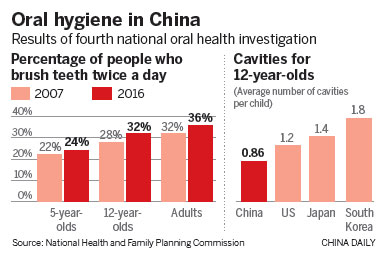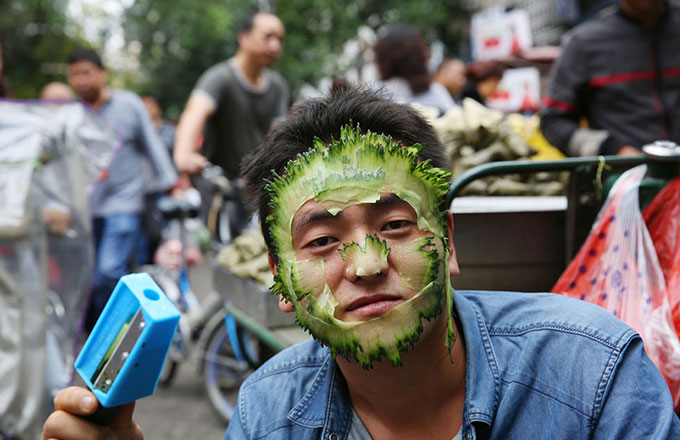China's teeth have room to improve
Awareness of oral hygiene up, but twice-daily brushers still low
Chinese people's awareness of oral health has been greatly enhanced in the past 10 years, especially among children and the elderly, a survey released on Tuesday found.
The results of the fourth national oral health epidemiological investigation were announced by the National Health and Family Planning Commission on Tuesday.
The investigation, undertaken in 2016, surveyed 172,000 people of different ages in 31 provincial regions of China.
It found that a few more people have cultivated good habits in taking care of their teeth, compared with past surveys. More than 30 percent of 12-year-old children and 36.1 percent of adults surveyed said they brushed their teeth twice a day in 2016. That's up from 28 percent for 12-year-olds and 32 percent for adults in 2007.
More children have received counsel from doctors about their oral health habits, as well as examinations and treatment.

Children are at high risk of tooth decay because of high sugar intake and insufficient oral care, data show. The World Health Organization considers 1.2 or fewer cavities - also called caries - in the teeth to be low incidence.
According to the investigation, the average number of cavities for a 12-year-old Chinese child in 2016 was 0.86 - below the WHO threshold and lower than the 1.2 cavities in the United States and 1.4 in Japan. China's cavity count was less than half of South Korea's average of 1.8 for 12-year-olds.
The health authority said elderly people performed better than middle-aged people when it comes to oral health. Elderly people ranging in age from 65 to 74 in China had 22.5 teeth on average, 1.5 more teeth than 10 years ago, which is a major improvement.
However, the rate of gingival bleeding and dental tartar (hardened plaque) among people aged 35 to 44, were 87.4 percent and 96.7 percent respectively, suggesting there's still plenty of room for improvement.
Wang Xing, an adviser for the Chinese Stomatological Association, said the main reasons middle-aged people have worse oral health lies in their heavy work stress and insufficient attention.
"Many middle-aged people are buried in work, and are short of time and energy to pay attention to their oral health. In addition, a number of them don't regard oral diseases as real diseases," Wang said. "They don't attach enough importance to it until they are unable to bear a toothache."
The investigation also shows a gap between cities and villages. People in cities performed better than those in rural areas in every aspect. In many rural areas, poor people do not go to the hospital for dental care because the high expenses are not covered by medical insurance.
Chang Jile, an official of the National Health and Family Planning Commission, said the government is working to extend the range of medical healthcare and to establish special programs.
"We have set up several programs aimed at certain oral diseases that will ease people's financial burden," Chang said. "For example, we have helped 12,000 elderly people in poor areas get their teeth filled for free and will continue to do so."
Jiang Chenglong contributed to this story.



























